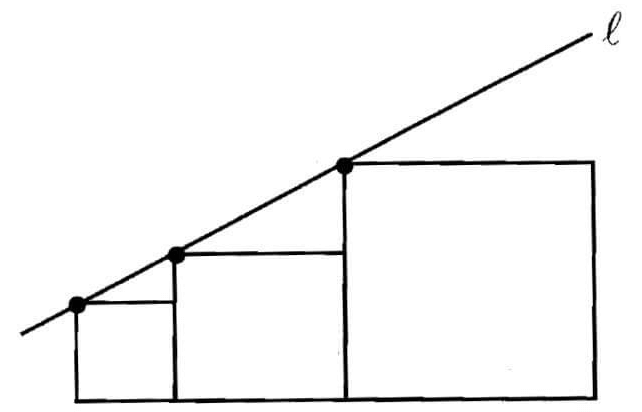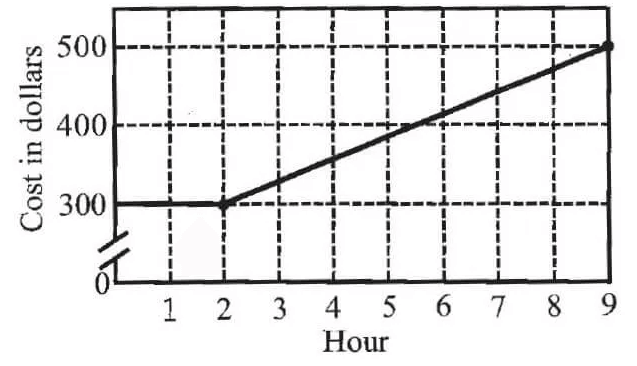EXPREMENTAL PROBABILITY WORD PROBLEMS WORKSHEET
Problem 1 :
Find the experimental probability of
(a) Tossing a head with one toss of a coin if it falls heads 96 times in 200 tosses.
(b) Rolling a six with a die given that when it was rolled 300 times, a six occurred 54 times
Problem 2 :
Find the experimental probability of rolling an odd number with a die if an odd number occurred 33 times when the die was rolled 60 times. Solution
Problem 3 :
Clem fired 200 arrows at a target and hit the target 168 times. Find the experimental probability of Clem hitting the target. Solution
Problem 4 :
Ivy has free-range hens. Out of the first 123 eggs that they laid she found that 11 had double-yolks. Calculate the experimental probability of getting a double-yolk egg from her hens. Solution
Problem 5 :
Jackson leaves for work at the same time each day. Over a period of 227 working days, on his way to work he had to wait for a train at the railway crossing on 58 days. Calculate the experimental probability that Jackson has to wait for a train on his way to work.
Problem 6 :
Ravi has a circular spinner marked P, Q and R on equal sectors. Find the experimental probability of getting a Q if the spinner was twirled 417 times and finished on Q on 138 occasions.
Problem 7 :
Each time Claude shuffled a pack of cards before a game, he recorded the suit of the top card of the pack His results for 140 games were 34 Hearts, 36 Diamonds, 38 Spades and 32 Clubs.
Find the experimental probability that the top card of a shuffled pack is :
(a) a Heart (b) a Club or Diamond
Problem 8 :
If a car factory checks 360 cars and 8 of them have defects, how many will have defects out of 1260?
Problem 9 :
If a car factory checks 320 cars and 12 of them have defects, how many out of 560 will NOT have defects?
Problem 10 :
What is the theoretical probability that an even number will be rolled on a number cube?
Problem 11 :
What was the experimental probability of how many times an even number was actually rolled using the table?
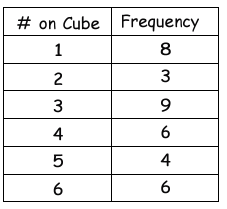
Problem 12 :
Martin has a bag of marbles. He removed one marble at random, recorded the color and then placed it back in the bag. He repeated this process several times and recorded his results in the table. Find the experimental probability of drawing each color.
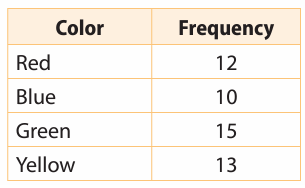

Answers :
(1) (a) 96/200 (b) 54/300
(2) 11/20
(3) 168/200
(4) 11/123
(5) 58/227
(6) 138/417
(7) (a) 34/140 (b) 68/140
(8) 28 cars are defective out of 1260 cars.
(9) 539 cars are not defective.
(10) 1/2
(11) 5/12
(12) Probability of drawing red color = 12/50
Probability of drawing blue = 10/50
Probability of drawing green color = 15/50
Probability of drawing yellow color = 13/50
Question 1 :
David tossed a coin 20 times and received head 12 times and tail 8 times. Find the experimental probability of getting tail.
Question 2 :
A dentist has 400 male and female patients that range in ages from 10 years old to 50 years old and up as shown in the table. What is the experimental probability that the next patient will be female and in the age range 22–39 ?

Question 3 :
A spinner has three unequal sections: red, yellow, and blue. The table shows the results of Nolan’s spins. Find the experimental probability of landing on each color. Write your answers in simplest form
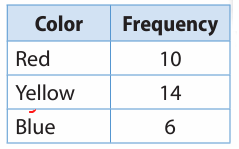
Question 4 :
A spinner has four sections lettered A, B, C, and D. The table shows the results of several spins. Find the experimental probability of spinning each letter as a fraction in simplest form, a decimal, and a percent.

Question 5 :
Rachel’s free-throw average for basketball is 60%. She wants to predict how many times in the next 50 tries she will make a free throw.
Question 6 :
A food trailer serves chicken and records the order size and sides on their orders, as show in the table. What is the experimental probability that the next order is for 3-pieces with cole slaw?

Question 7 :
Drink sales for an afternoon at the school carnival were recorded in the table. What is the experimental probability that the next drink is a small cocoa?
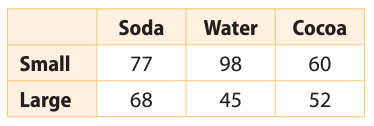
Question 8 :
A jeweler sells necklaces made in three sizes and two different metals. Use the data from a simulation to find the experimental probability that the next necklace sold is a 20-inch gold necklace.
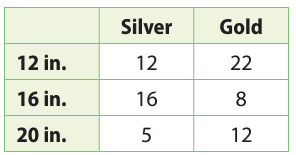
Answer Key
1) Experimental probability = 2/5
2) 1/8
3)
Probability of landing on yellow color = 14/30
Probability of landing on blue color = 6/30
4)
Probability of getting A = 7/20 = 0.35 = 35%
Probability of getting B = 7/40 = 0.175 = 17.5%
Probability of getting C = 11/40 = 0.275 = 27.5%
Probability of getting D = 1/5 = 0.2 = 20%
5) 30 times
6) 1/6
7) 3/20
8) 0.16
Kindly mail your feedback to v4formath@gmail.com
We always appreciate your feedback.
©All rights reserved. onlinemath4all.com
Recent Articles
-
Digital SAT Math Problems and Solutions (Part - 146)
Apr 18, 25 06:52 AM
Digital SAT Math Problems and Solutions (Part - 146) -
Logarithmic Derivative Problems and Solutions
Apr 16, 25 09:25 PM
Logarithmic Derivative Problems and Solutions -
Digital SAT Math Problems and Solutions (Part - 145)
Apr 16, 25 12:35 PM
Digital SAT Math Problems and Solutions (Part - 145)
